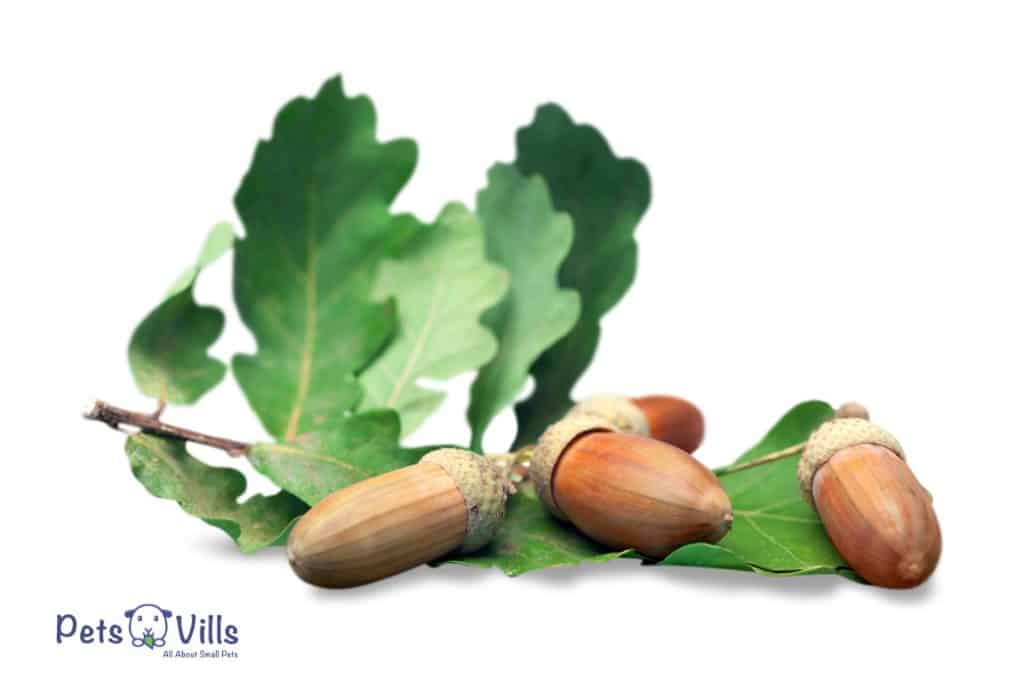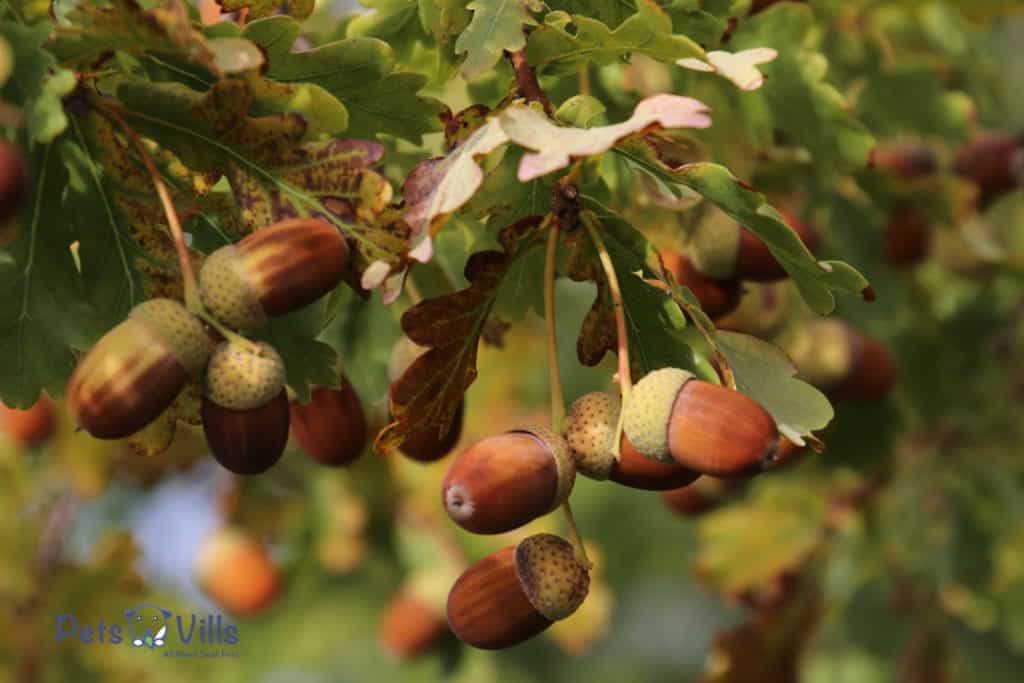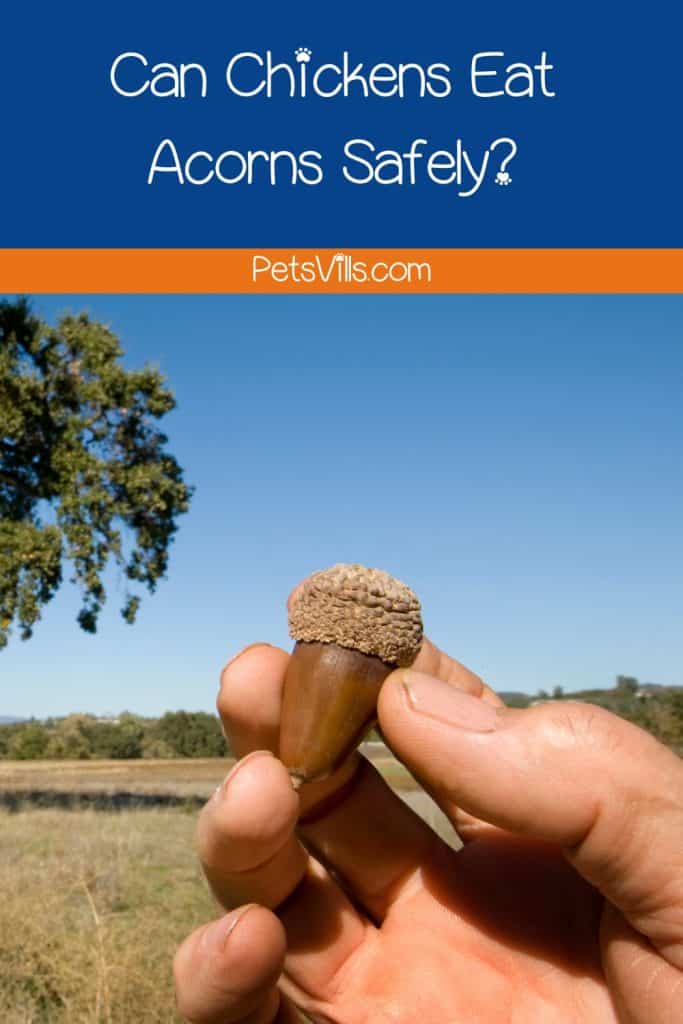Wondering, “can chickens eat acorns”? Here’s the truth:
Yes, they can, but stay away from the raw version!
If you have an oak tree growing in your backyard, since the acorns growing on each oak tree are so plentiful, you may wonder if chickens can eat them.
Without further ado, keep scrolling to learn more about acorns and chickens (You can’t miss this)…
Table of Contents
Key Takeaways
- Acorns are rich in nutrition, including protein, carbohydrates, fats, calcium, phosphorus, potassium, and niacin. They also contain antioxidants that can help keep chickens healthy.
- Raw acorns and acorn leaves are toxic to chickens (and other animals) and should not be fed to them. The tannic acid in raw acorns can cause stomach pain, constipation, and vomiting.
- Baby chickens can eat acorns, but only after they have been leached. To leach acorns, boil them in water and change the water until it boils clear.
- Acorns should only make up 10% of a chicken’s diet and should be given as treats in moderation. The rest of their diet should come from commercial feeds.
Health Benefits of Acorns for Chickens
According to Wayne Askew, an esteemed professor from the Division of Nutrition at the College of Health, University of Utah (1):
“Acorns contain large amounts of protein, carbohydrates, and fats, as well as the minerals calcium, phosphorus, and potassium, and the vitamin niacin.“
Once the acorns are leached to remove all the toxins, they are actually very rich in nutrition. They contain a large amount of protein, carbohydrates, and fats.
In addition, it also has calcium, phosphorus, potassium, and vitamin niacin.
- Rich in antioxidants. Antioxidants help the cells from damage caused by harmful molecules called free radicals (2).
Chickens fed a high diet of antioxidant food will help keep them healthy than chickens that are not.
- Maintain and repair muscle. Acorns contain proteins, which can help with muscle development. Besides that, protein is needed to produce strong and healthy eggs.
Don’t forget to check out this brilliant video for a visual summary of acorns:
Are Acorns Toxic to Chickens?
Acorns, in their raw form, are toxic to chickens and other animals. The acorns are covered in tannic acid, which has a bitter taste.
If you’re considering adding acorns to your chickens’ diet, you must be aware of the potential risks.
Some acorns contain toxic compounds that can harm your birds, particularly in large quantities.
Raw acorns are toxic not only to chickens but to humans as well. The symptoms for humans and chickens will be stomach pain, constipation, and vomiting.
Therefore, never feed raw acorns to chickens.
CHECK: Are Walnuts Safe for Chickens?
Can Chickens Eat Acorn Leaves?
The acorn leaves should not be fed to the chickens.

The leaves contain tannins as well but in small quantities. Feeding them to the chickens might not cause any health issues, but a significant amount can.
Can Baby Chickens Eat Acorns?
Baby chickens can eat acorns, but they must be leached first. This will help remove all the toxins from the acorn, so it’ll be safe for them to eat.
Do not give baby chickens any fresh raw acorns, as the toxin could kill them.
How To Feed Acorns To Chickens
Feeding acorns to the chickens is relatively easy as they tend to eat anything that’s given to them. Before feeding acorns to the chickens, make sure to leach them first to remove all the tannins.
If not, the toxin can make the chickens very ill and even cause death if they consume enough of it.
To feed chickens acorns, first, leach the acorns to remove tannins.
Then, either sprinkle the crushed pieces over the ground while the chickens are feeding or mix them with their feeds to increase the nutritional value of their diet.
Again, if you plan to feed them acorns, you must leach them first. Below are the instructions to leach acorns:
How to Leach Acorns
Remove the shells and caps from your acorns before leaching them. Do not eat the raw meat of the acorns until you leach them first:
- Start by boiling water in two different pots. They don’t have to be the same size but large enough to hold all the acorns you have.
- Drop the raw, shell-less acorns into one pot.
- Let them boil for about 10 minutes or until the water darkens.
- Once the water is dark, strain the nuts through a colander.
- After all the water is drained, put the nuts into the second pot of boiling water.
- In the first pot, refill the water to a boil again.
- Repeat the process until the water boils clear. This may take about an hour or more, depending on the variety of acorns you have.
If you’re in a hurry to feed them to the chickens, you can use this other method to leach the acorns. It will take a couple of days, though:
- In a large container, pour cold water half full.
- Drop the raw shell-less acorns into the container.
- Let them soak in the water to leach the tannins out.
- Change the water when the color starts to turn darker.
- Repeat the process until the water no longer turns to a dark color.
This process will take a couple of days to remove all the tannins from the acorns.
How Much And How Often To Feed Acorns To Chickens
The acorns are plentiful for those with oak trees in their yard, but the problem is preparing them so it’s safe for the chickens to eat them.

It takes a while to remove all toxins, so most people tend not to bother feeding chickens the acorns.
But, if you’re one of those who want to feed acorns to the chicken, they can benefit a lot of nutrition from it.
If you’re planning to feed acorns to the flocks, they should only be provided to the chickens in moderation. These should be given to them as treats, making up 10% of their diet.
The rest should come from the commercial feeds.
You absolutely must also check out my super informative article, “Can Chickens Have Almond Milk?” It’s a delightful read that’ll leave you clucking with joy!
FAQs
1. Are all types of acorns safe for chickens to eat?
Not all types of acorns are safe for chickens. Some species, like the oak acorn, are safe, while others, such as the tanoak acorn, are toxic.
2. Can chickens eat acorns as their primary source of food?
While acorns provide essential nutrients, they should not be the primary source of food for chickens.
A balanced diet with other feed options is necessary for their health and well-being.
Conclusion
If you’re wondering, “can chickens eat acorns” you’ve got your answer. But let me wrap it all up:
Yes, chickens can eat acorns, but caution must be exercised to avoid potential risks.
Acorns are a rich source of nutrition for chickens, including protein, carbohydrates, fats, calcium, phosphorus, potassium, niacin, and antioxidants.
In addition, the raw version of acorns and acorn leaves are toxic to chickens and should not be fed to them.
It’s important only to feed them certain acorns in moderation and adequately prepare them to reduce the risk of toxic compounds.
If you’re keen to share any striking tips, please comment below. I’d love to hear from you!

Resources
1. Jenkins JB. Acorns a Superfood? [Internet]. healthcare.utah.edu. 2015. Available from: https://healthcare.utah.edu/healthfeed/postings/2015/01/012215_superfood-acorns.php#:~:text=%E2%80%9CAcorns%20contain%20large%20amounts%20of
2. Meixner M. Can You Eat Acorns? Nutrition, Benefits, and Dangers [Internet]. Healthline. 2019 [cited 2023 Feb 16]. Available from: https://www.healthline.com/nutrition/can-you-eat-acorns#generally-safe
Alina Hartley is a small-town girl with a ginormous love of bearded dragons. It all started with Winchester, a baby bearded who was abandoned at the shelter by his former owners because of a birth defect that caused one front leg to be shorter than the other. Alina originally went to the shelter looking for a guinea pig, but one look at Winchester and it was love at first sight. From that day on, Alina has dedicated her life to learning everything she can about bearded dragons. She loves helping new beardie parents start their incredible journey with these magnificent reptiles.
Follow her on:
LINKEDIN
TWITTER.
Read her latest articles HERE
Learn more about her HERE.


